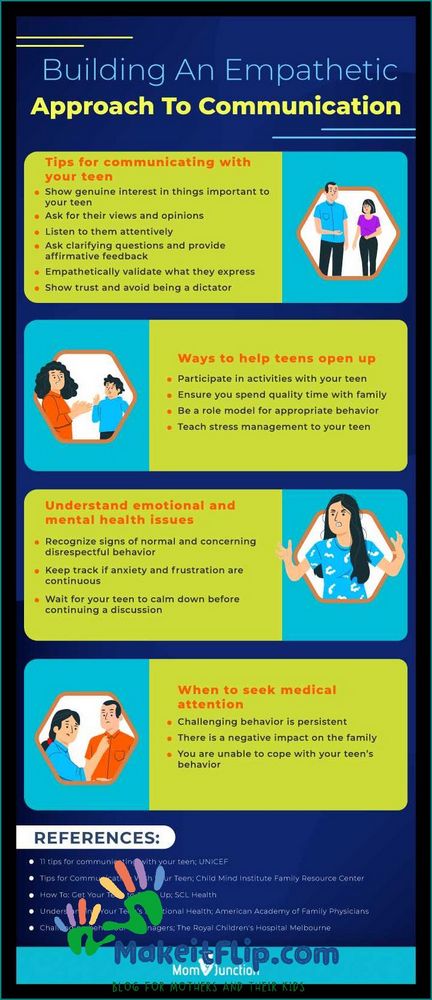Contents
- 1 Exploring the Causes, Signs, and Effective Strategies for Managing Teenage Rebellion
- 1.1 Causes of Teenage Rebellion
- 1.2 Signs of Teenage Rebellion
- 1.3 FAQ about topic Understanding Teenage Rebellion Causes Signs and How to Deal With It
- 1.3.1 What are some common causes of teenage rebellion?
- 1.3.2 How can I identify signs of teenage rebellion in my child?
- 1.3.3 What are some effective ways to deal with teenage rebellion?
- 1.3.4 Is teenage rebellion a normal part of adolescence?
- 1.3.5 How can I maintain a healthy relationship with my rebellious teenager?
Exploring the Causes, Signs, and Effective Strategies for Managing Teenage Rebellion

Teenage rebellion is a common phenomenon that occurs as adolescents strive for independence and self-identity. It is a form of protest, defiance, and revolt against parental authority and societal norms. During this stage of development, teenagers often question rules and boundaries, seeking to establish their own sense of individuality. Understanding the causes and signs of teenage rebellion is crucial for parents and caregivers to effectively navigate this challenging period.
One of the primary causes of teenage rebellion is the natural desire for independence. As teenagers strive to assert their autonomy, they may engage in behaviors that challenge authority figures. This rebellion can manifest in various ways, such as breaking rules, experimenting with risky behaviors, or expressing unconventional beliefs. It is important for parents to recognize that this rebellion is a normal part of adolescent development and not necessarily indicative of a problematic relationship.
Signs of teenage rebellion can include increased arguments and conflicts, defiance of rules, withdrawal from family activities, and a desire for greater privacy. Teenagers may also exhibit changes in appearance, such as adopting a different style of clothing or hairstyle, as a way to express their individuality. It is essential for parents to differentiate between normal teenage rebellion and more serious behavioral issues, such as substance abuse or mental health concerns.
Dealing with teenage rebellion requires a delicate balance of setting boundaries while also allowing for independence. It is important for parents to establish clear rules and expectations, while also providing opportunities for teenagers to make their own choices and learn from their mistakes. Open and honest communication is key, as it allows parents to understand their teenager’s perspective and concerns. Seeking professional help, such as family therapy, can also be beneficial in navigating this challenging period.
Causes of Teenage Rebellion

Teenage rebellion is a common phenomenon that occurs during adolescence. It is characterized by a revolt against authority, defiance of rules, and a desire for independence. There are several factors that can contribute to teenage rebellion, including:
1. Hormonal changes: During puberty, teenagers experience significant hormonal changes that can lead to mood swings, increased emotions, and a sense of angst. These hormonal fluctuations can contribute to feelings of frustration and rebellion.
2. Desire for autonomy: Teenagers are in the process of developing their own identity and sense of self. They may feel the need to assert their independence and challenge authority figures as a way to establish their own beliefs and values.
3. Peer influence: Peer pressure can play a significant role in teenage rebellion. Teenagers may feel the need to conform to their peers’ behaviors and attitudes, even if it goes against their own values or the rules set by their parents or society.
4. Family dynamics: Family conflicts and dysfunctional relationships can contribute to teenage rebellion. If a teenager feels misunderstood, neglected, or controlled by their family, they may rebel as a way to assert their own needs and desires.
5. Societal influences: The media, popular culture, and societal norms can also influence teenage rebellion. Teenagers may protest against societal expectations and norms, seeking to challenge and change the status quo.
It is important for parents and caregivers to understand the underlying causes of teenage rebellion in order to effectively address and manage it. Open communication, setting clear boundaries, and providing support and guidance can help teenagers navigate this challenging phase of their lives.
Search for Identity

During adolescence, teenagers often experience a strong desire to find their own identity. This search for identity can manifest itself in various ways, including rebellion, angst, defiance, protest, and even outright rebellion.
Teenagers may rebel against authority figures, such as parents, teachers, or other adults, as they strive to establish their independence and assert their individuality. This rebellion can take the form of challenging rules and boundaries, questioning established norms and values, and expressing their own opinions and beliefs.
Feelings of angst and confusion are common during this search for identity. Teenagers may feel a sense of unease or dissatisfaction with their current circumstances, leading them to question who they are and what they want out of life. This can result in mood swings, emotional outbursts, and a general sense of restlessness.
Defiance and protest are also common behaviors exhibited by teenagers searching for their identity. They may engage in acts of defiance, such as refusing to conform to societal expectations or rebelling against authority figures. They may also participate in protests or social movements as a way to express their beliefs and values.
It is important for parents and adults to understand that teenage rebellion and the search for identity are normal parts of adolescent development. While it can be challenging to navigate, it is essential to provide support and guidance to teenagers during this time. Encouraging open communication, setting reasonable boundaries, and allowing teenagers to explore their interests and passions can help them on their journey to self-discovery.
Peer Pressure

One of the main causes of teenage rebellion is peer pressure. Teenagers often feel the need to conform to the expectations and behaviors of their peers, even if it goes against their own values or beliefs. This pressure to fit in can lead to feelings of revolt, rebellion, and angst.
Peer pressure can manifest in various ways, such as influencing a teenager to engage in risky behaviors, experiment with drugs or alcohol, or participate in activities that may be considered inappropriate or dangerous. In an attempt to gain acceptance and avoid being ostracized, teenagers may feel compelled to go along with the crowd, even if they personally disagree or feel uncomfortable.
It is important for parents and caregivers to be aware of the signs of peer pressure and to provide guidance and support to teenagers who may be struggling with this issue. Open communication and a non-judgmental approach can help teenagers feel comfortable discussing their experiences and concerns.
Teenagers may also engage in acts of protest or defiance as a way to assert their independence and establish their own identity. This can be a natural part of the teenage years as they navigate the transition from childhood to adulthood. However, it is important for parents to set clear boundaries and expectations while still allowing teenagers to express themselves and make their own choices within reason.
Dealing with peer pressure requires a combination of understanding, empathy, and guidance. It is important for parents and caregivers to provide a supportive environment where teenagers feel safe to express their thoughts and emotions. Encouraging healthy friendships and positive role models can also help teenagers resist negative peer influences and make choices that align with their own values and aspirations.
By addressing peer pressure and providing the necessary support, parents and caregivers can help teenagers navigate the challenges of adolescence and develop into confident, independent individuals.
Desire for Independence

One of the main causes of teenage rebellion is the strong desire for independence. As teenagers go through puberty and start to develop their own identities, they often feel the need to assert themselves and break away from their parents’ control. This desire for independence can manifest in various ways, including protest, angst, defiance, and even outright revolt.
Teenagers may start to question authority figures, including their parents and teachers, as they strive to establish their own sense of self. They may resist rules and regulations, seeking to assert their own autonomy and make their own decisions. This can lead to conflicts and power struggles within the family unit.
During this stage of development, teenagers may also seek out new experiences and relationships outside of their family. They may want to spend more time with their friends or explore new hobbies and interests. This can sometimes lead to clashes with parents who may worry about their teenager’s safety or prioritize different values.
It is important for parents to recognize and respect their teenager’s need for independence while also setting appropriate boundaries. Open communication, mutual respect, and compromise can help parents and teenagers navigate this challenging period and maintain a healthy relationship.
Signs of Teenage Rebellion

Teenage rebellion can manifest in various ways, and it is important for parents and guardians to be aware of the signs. These signs can help identify if a teenager is going through a phase of revolt, angst, or protest against authority figures or societal norms.
Here are some common signs of teenage rebellion:
| 1. Change in appearance: | A teenager may experiment with different hairstyles, clothing styles, or body piercings as a way to assert their independence and defy societal expectations. |
| 2. Increased defiance: | A teenager may become more argumentative, resistant, and disobedient towards authority figures such as parents, teachers, or other adults. |
| 3. Risk-taking behavior: | Engaging in risky activities such as experimenting with drugs or alcohol, reckless driving, or participating in dangerous sports can be a sign of teenage rebellion. |
| 4. Social withdrawal: | A teenager may isolate themselves from family and friends, preferring to spend time alone or with a new group of peers who share similar rebellious attitudes. |
| 5. Academic decline: | Rebellion can often lead to a decline in academic performance as a teenager may lose interest in school, skip classes, or neglect their homework. |
| 6. Breaking rules: | Deliberately breaking rules, curfews, or engaging in activities that are forbidden by parents or guardians can be a clear sign of teenage rebellion. |
| 7. Seeking independence: | A teenager may express a strong desire for independence, wanting to make their own decisions and have control over their own life. |
It is important for parents and guardians to approach teenage rebellion with understanding and open communication. By acknowledging their need for independence while setting boundaries and providing guidance, it is possible to navigate this challenging phase and foster a healthy relationship with the teenager.
Defiance and Disobedience

One of the most common signs of teenage rebellion is defiance and disobedience. Teenagers often revolt against authority figures, such as parents, teachers, and other adults in their lives. This defiance is often fueled by a sense of angst and a desire for independence.
Teenagers may engage in acts of defiance as a way to assert their independence and establish their own identity. They may refuse to follow rules, ignore curfews, or engage in risky behaviors as a form of protest. This defiance can be frustrating and challenging for parents and other authority figures who are trying to guide and protect teenagers.
It is important for parents and adults to understand that this defiance is a normal part of teenage development. Teenagers are going through a period of self-discovery and are trying to assert their independence. It is important to give them the space and freedom to express themselves, while also setting clear boundaries and consequences for their actions.
Dealing with defiance and disobedience requires open communication and understanding. It is important to listen to teenagers’ perspectives and try to empathize with their feelings of frustration and rebellion. At the same time, it is important to establish rules and expectations and enforce them consistently.
Parents and adults can also help teenagers find healthy outlets for their rebellion and independence. Encouraging them to engage in activities that allow them to express themselves, such as art, music, or sports, can help channel their energy in a positive way. Providing them with opportunities for leadership and decision-making can also help them feel a sense of control and autonomy.
Overall, defiance and disobedience are common aspects of teenage rebellion. By understanding the underlying causes and finding constructive ways to address them, parents and adults can navigate this challenging period and help teenagers grow into responsible and independent individuals.
FAQ about topic Understanding Teenage Rebellion Causes Signs and How to Deal With It
What are some common causes of teenage rebellion?
Some common causes of teenage rebellion include a desire for independence, peer pressure, family conflicts, and a search for identity.
How can I identify signs of teenage rebellion in my child?
Signs of teenage rebellion may include sudden changes in behavior, defiance of authority, withdrawal from family and friends, and involvement in risky behaviors.
What are some effective ways to deal with teenage rebellion?
Some effective ways to deal with teenage rebellion include open communication, setting clear boundaries and consequences, providing support and understanding, and seeking professional help if needed.
Is teenage rebellion a normal part of adolescence?
Yes, teenage rebellion is a normal part of adolescence as teenagers go through a period of self-discovery and asserting their independence.
How can I maintain a healthy relationship with my rebellious teenager?
To maintain a healthy relationship with your rebellious teenager, it is important to listen to them, respect their feelings, give them space, and find common ground. It is also important to set boundaries and rules while still showing love and support.
I’m Diana Ricciardi, the author behind Makeitflip.com. My blog is a dedicated space for mothers and their kids, where I share valuable insights, tips, and information to make parenting a bit easier and more enjoyable.
From finding the best booster seat high chair for your child, understanding the connection between sciatica and hip pain, to exploring the benefits of pooping in relieving acid reflux, I cover a range of topics that are essential for every parent.
My goal is to provide you with practical advice and solutions that you can easily incorporate into your daily life, ensuring that you and your child have the best possible experience during these precious years.
